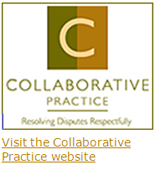Collaborative Law
Santa Rosa Collaborative Law Attorney
The collaborative law movement is a reaction to dissatisfaction with outcomes and processes in traditional litigation and mediation models. In this process, the parties are not submitting their issues to mediation or to be decided by a judge. They attempt to come to an acceptable agreement themselves, with guidance from specially trained coaches, usually marriage and family counselors, and financial specialists. Lawyers representing the parties pledge to foster a mutually acceptable outcome, not a win-lose outcome.
Contact Charles D. Stark, Attorney at Law. As a Santa Rosa collaborative law lawyer, I have more than 40 years of experience providing client-centered solutions to family law issues. I will help you determine exactly what your personal settlement needs are and how we can work together to negotiate the agreement that is right for you. I have the extensive training required to be an alternative dispute resolution (ADR) attorney.
How the Collaborative Law Process Works
You may wonder: What is collaborative family law? In a nutshell, this process requires both parties and attorneys to agree to full disclosure and no court proceedings. Even though your marriage is over, a relationship between you and your ex may still be necessary for the sake of your children or other interests. Thus, the collaborative approach is more supportive than mediation and less adversarial than litigation. It is designed to foster a working relationship after the marriage is over. Also, this approach is usually less costly and time consuming, and more durable than litigation.
Financial, child or business valuation specialists may also be added to the team on a tailored and efficient basis to assist in developing and understanding options in those particular issues. These specialists can also help facilitate constructive communication between the parties and avoid talks breaking down or becoming intractable.
The Collaborative Process may not be for everyone. Where one party is not committed to full disclosure or where there are certain mental health, chemical dependency, or domestic violence issues, Collaborative Practice might not be suitable. I can help you settle your issues through the traditional litigation process where appropriate.
I can help explore whether alternatives to traditional litigation may be the right fit for you.
Collaborative law requires parties and attorneys to agree to full disclosure and no court proceedings. Even though the marriage is over, a relationship between the parties may still be necessary for the sake of the children or other interests. Thus, the collaborative approach is more supportive than mediation and less adversarial than litigation, and it is designed to foster a working relationship after the marriage is over. Moreover, the approach is usually less-costly and time-consuming than litigation.
I offer:
- Client-centered solutions focused on client needs and goals with respect for client budgets
- Private civil law practice, set within resources of large firm providing personal service with skills ranging from negotiation, mediation, collaborative practice, and litigation when necessary
- Extensive experience in transactional and contract and document preparation, handling business and real estate matters directly or within estate planning or marital estate matters
- Over 40 years experience offering client centered solutions to family law and estate planning issues. Skill sets including court litigation, negotiation, mediation, and collaborative law practice.
In my mediation and collaborative family law practice, I will help you determine exactly what your personal settlement needs are, and how we can work together to negotiate an agreement that is right for you. I have extensive training required to also be a professional mediator and alternative dispute resolution (ADR) attorney.
Contact a Collaborative Family Law Lawyer in Sonoma County
Contact me online or by phone at 707-527-9900, to discuss ways that collaborative law can help you achieve an outcome that works for everybody.
